Page 97 of 165
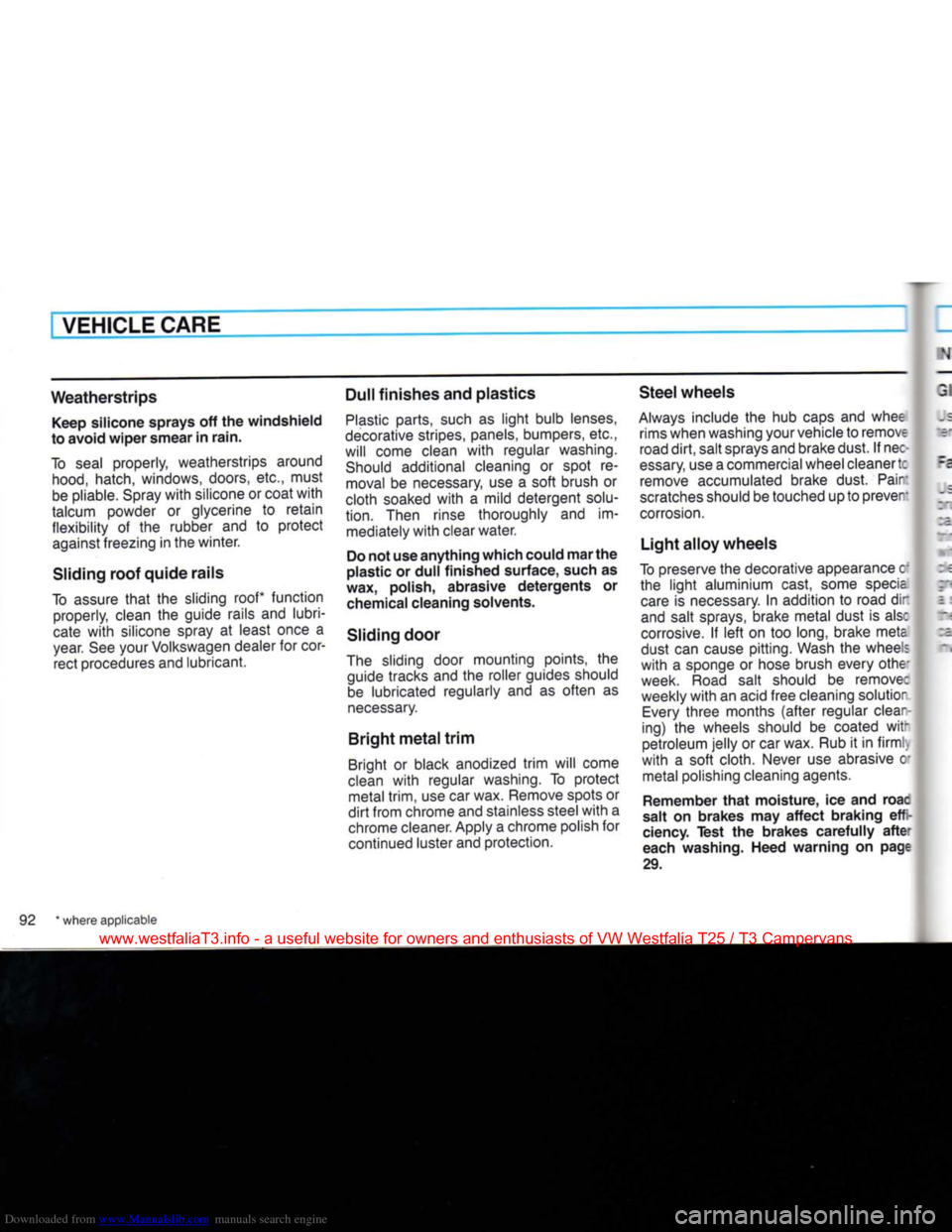
Downloaded from www.Manualslib.com manuals search engine
VEHICLE
CARE
Weatherstrips
Keep silicone sprays
off the
windshield
to avoid wiper smear
in
rain.
To seal properly, weatherstrips around
hood,
hatch, windows, doors,
etc.,
must
be pliable. Spray with silicone
or
coat with
talcum powder
or
glycerine
to
retain
flexibility
of the
rubber
and to
protect against freezing
in the
winter.
Sliding roof quide rails
To assure that
the
sliding roof* function properly, clean
the
guide rails
and
lubri
cate with silicone spray
at
least once
a
year.
See
your Volkswagen dealer
for
cor rect procedures
and
lubricant.
Dull finishes and plastics
Plastic parts, such
as
light bulb lenses,
decorative stripes, panels, bumpers,
etc.,
will come clean with regular washing. Should additional cleaning
or
spot
re
moval
be
necessary,
use a
soft brush
or
cloth soaked with
a
mild detergent
solu
tion.
Then rinse thoroughly
and im
mediately with clear water.
Do not use anything which could mar the
plastic
or
dull finished surface, such
as
wax, polish, abrasive detergents
or
chemical cleaning solvents.
Sliding door
The sliding door mounting points,
the
guide tracks
and the
roller guides should be lubricated regularly
and as
often
as
necessary.
Bright metal trim
Bright
or
black anodized trim will come
clean with regular washing.
To
protect metal
trim,
use car
wax. Remove spots
or
dirt from chrome
and
stainless steel with
a
chrome cleaner. Apply
a
chrome polish
for
continued luster and protection.
Steel wheels
Always include
the hub
caps
and
whee rims when washing your vehicle
to
remove
road dirt, salt sprays and brake dust.
If
nec
essary,
use a
commercial wheel cleaner
t:
remove accumulated brake dust. Pain:
scratches should
be
touched
up to
prever
corrosion.
Light alloy wheels
To preserve
the
decorative appearance
c-
the light aluminium cast, some specie
care
is
necessary.
In
addition
to
road
dr
and salt sprays, brake metal dust
is
alsc
corrosive.
If
left
on too
long,
brake meta
dust
can
cause pitting. Wash
the
wheels
with
a
sponge
or
hose brush every othe-
week. Road salt should
be
remove:
weekly with
an
acid free cleaning solutior Every three months (after regular clear
ing)
the
wheels should
be
coated
wit-
petroleum jelly
or car
wax.
Rub it in
firml.
with
a
soft cloth. Never
use
abrasive
c
metal polishing cleaning agents.
Remember that moisture,
ice and
roac
salt
on
brakes
may
affect braking
eff
ciency. Test
the
brakes carefully afte'
each washing. Heed warning
on
page
29.
92
*
where applicable
www.westfaliaT3.info - a useful website for owners and enthusiasts of VW Westfalia T25 / T3 Campervans
Page 98 of 165
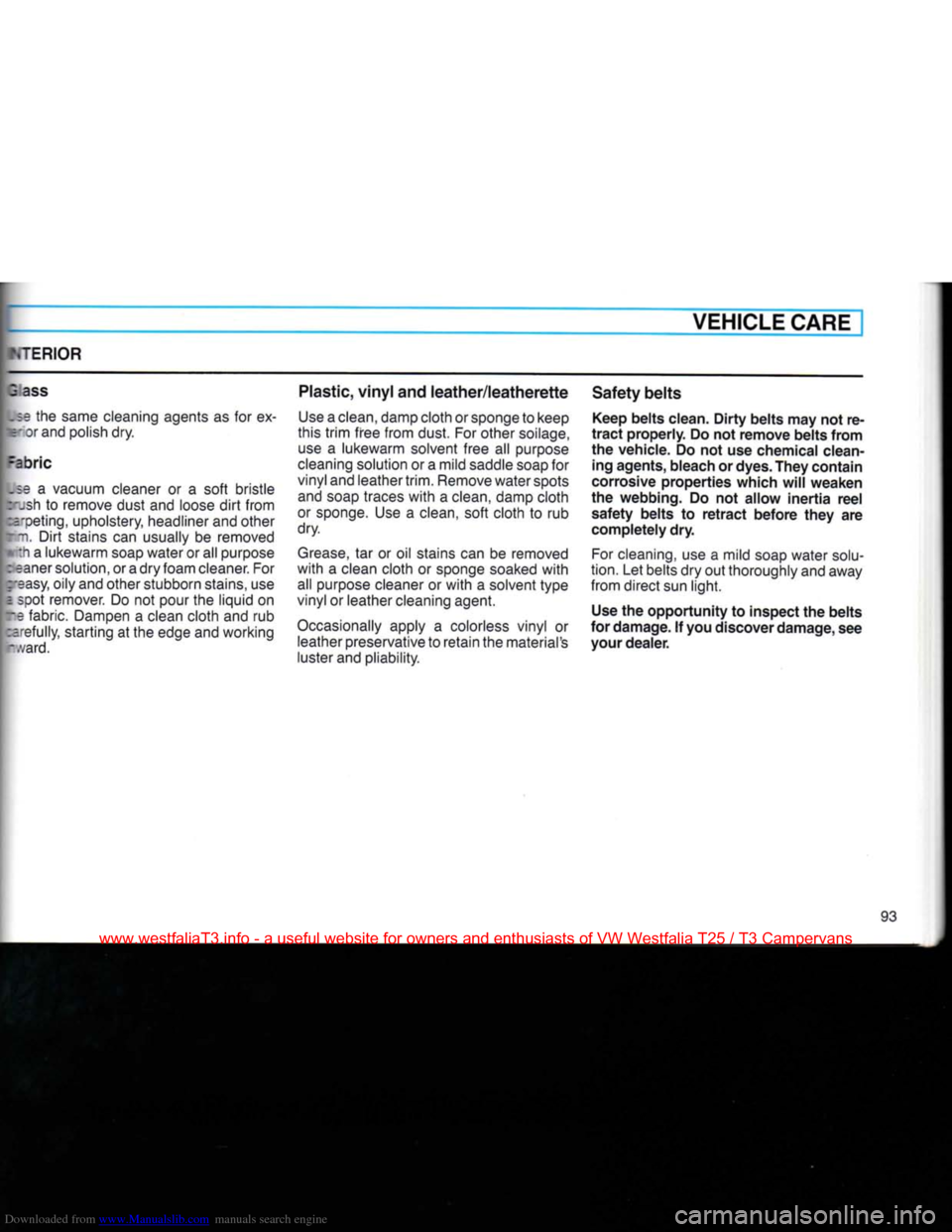
Downloaded from www.Manualslib.com manuals search engine
VEHICLE
CARE
MERIOR
3 ass
.5=
the
same cleaning agents
as for ex-
f
-
or
and polish
dry.
:abric
Lse
a
vacuum cleaner
or a
soft bristle
brjsh
to
remove dust
and
loose dirt from
ri'peting,
upholstery, headliner
and
other r
Ti.
Dirt stains
can
usually
be
removed :h
a
lukewarm soap water
or all
purpose
: eaner solution,
or a
dry foam cleaner.
For
reasy, oily and other stubborn stains,
use
= spot remover.
Do not
pour
the
liquid
on
~e fabric. Dampen
a
clean cloth
and rub
rarefully, starting
at the
edge
and
working
ward.
Plastic, vinyl and leather/leatherette
Use
a
clean, damp cloth
or
sponge
to
keep
this trim free from dust.
For
other soilage, use
a
lukewarm solvent free
all
purpose
cleaning solution
or a
mild saddle soap
for
vinyl and leather
trim.
Remove water spots and soap traces with
a
clean, damp cloth
or sponge.
Use a
clean, soft cloth
to rub
dry.
Grease,
tar or oil
stains
can be
removed
with
a
clean cloth
or
sponge soaked with all purpose cleaner
or
with
a
solvent type
vinyl
or
leather cleaning agent.
Occasionally apply
a
colorless vinyl
or
leather preservative
to
retain
the
material's
luster
and
pliability. Safety belts
Keep belts clean. Dirty belts may not re
tract properly. Do not remove belts from
the vehicle. Do not use chemical clean ing agents, bleach or dyes. They contain
corrosive properties which will weaken
the webbing. Do not allow inertia reel safety belts to retract before they are
completely dry.
For cleaning,
use a
mild soap water
solu
tion.
Let
belts
dry out
thoroughly and away
from direct
sun
light.
Use the opportunity to inspect the belts
for damage. If you discover damage, see your dealer.
www.westfaliaT3.info - a useful website for owners and enthusiasts of VW Westfalia T25 / T3 Campervans
Page 99 of 165
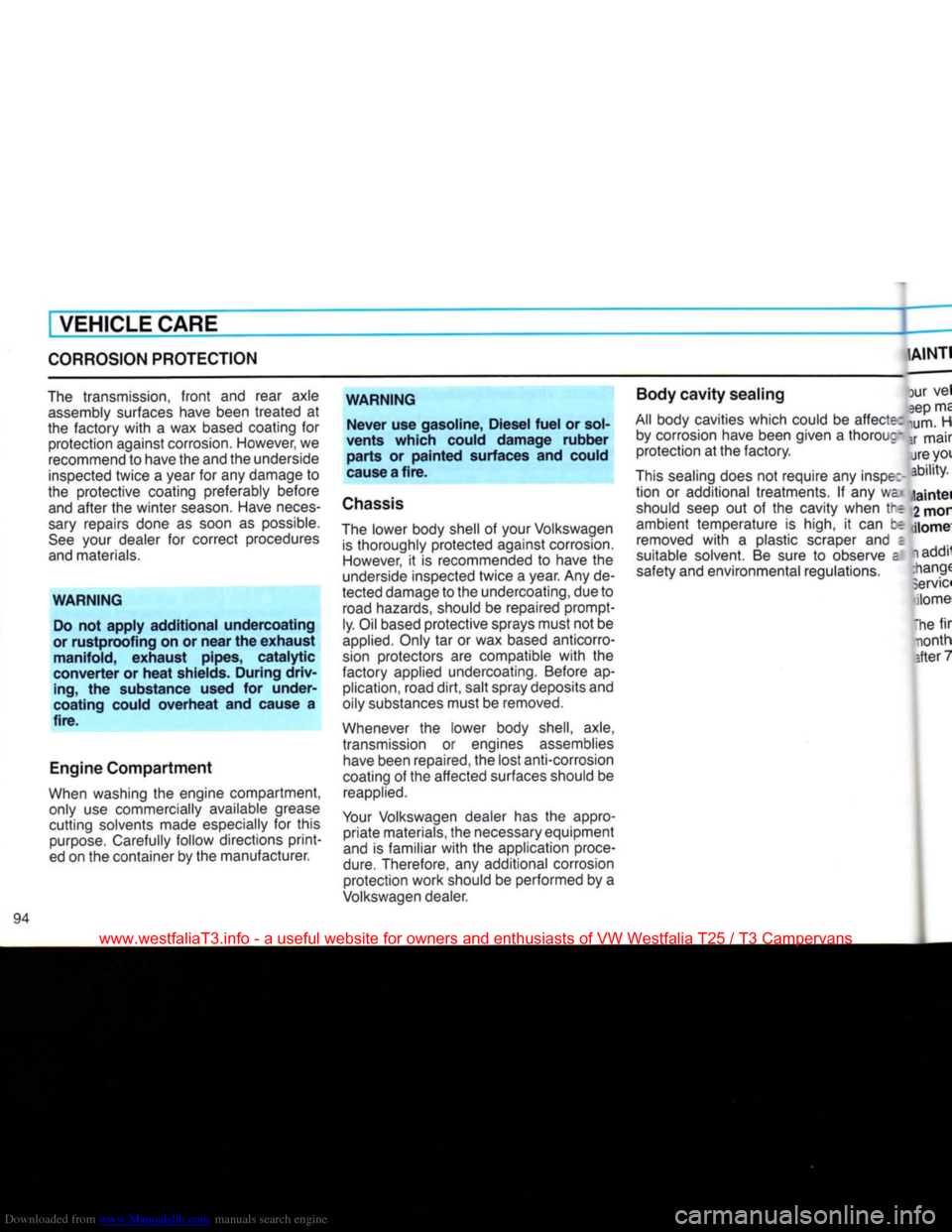
Downloaded from www.Manualslib.com manuals search engine
VEHICLE CARE
CORROSION
PROTECTION
The transmission,
front
and rear axle
assembly
surfaces have been treated at
the factory
with
a wax based coating for protection against corrosion. However, we
recommend to have the and the underside
inspected twice a year for any damage to
the protective coating preferably before and after the winter
season.
Have
neces
sary
repairs done as soon as possible.
See
your dealer for correct procedures
and materials.
WARNING
Do not
apply
additional
undercoating
or
rustproofing
on or
near
the
exhaust
manifold,
exhaust
pipes,
catalytic
converter
or
heat
shields.
During
driv
ing, the substance used for
under-
coating
could
overheat
and cause a
fire.
Engine
Compartment
When washing the engine compartment, only use commercially available grease
cutting solvents made especially for this
purpose.
Carefully follow directions
print
ed
on the container by the manufacturer.
WARNING
Never
use gasoline,
Diesel
fuel
or sol
vents
which
could
damage
rubber
parts
or
painted
surfaces and could
cause a
fire.
Chassis
The lower body shell of your Volkswagen
is
thoroughly protected against corrosion. However, it is recommended to have the
underside inspected twice a year. Any de
tected damage to the undercoating, due to road hazards, should be repaired prompt
ly. Oil based protective sprays must not be
applied.
Only tar or wax based anticorro-
sion
protectors are compatible
with
the
factory applied undercoating. Before ap plication, road
dirt,
salt spray deposits and
oily substances must be removed.
Whenever
the lower body
shell,
axle, transmission or engines assemblies have been repaired, the lost anti-corrosion
coating of the affected surfaces should be
reapplied.
Your
Volkswagen dealer has the appro priate materials, the necessary equipment
and is familiar
with
the application proce
dure. Therefore, any additional corrosion protection work should be performed by a
Volkswagen
dealer.
Body
cavity sealing
All
body cavities which could be affecte: by corrosion have been given a thorouc"
protection at the factory.
This
sealing does not require any inspe:
tion
or additional treatments. If any wa should seep out of the cavity when tN
ambient temperature is high, it can M removed
with
a plastic scraper and -.
suitable solvent. Be sure to observe a
safety and environmental regulations.
94
www.westfaliaT3.info - a useful website for owners and enthusiasts of VW Westfalia T25 / T3 Campervans
Page 100 of 165
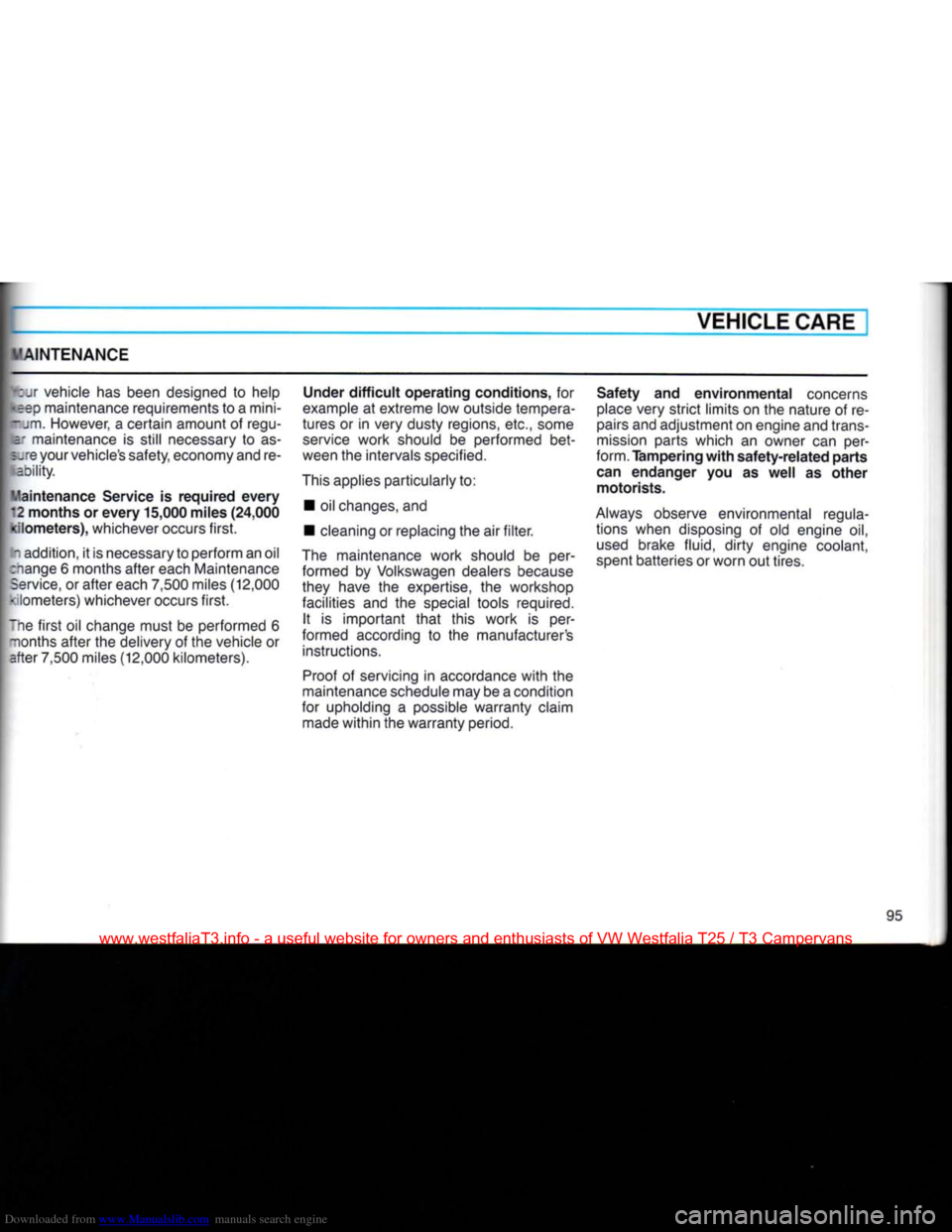
Downloaded from www.Manualslib.com manuals search engine
AINTENANCE
VEHICLE CARE
Ibur
vehicle has been designed to help «eep maintenance requirements to a mini--jm. However, a certain amount of regu
lar maintenance is still necessary to as s-re your vehicle's safety, economy and re- ability.
Maintenance
Service is
required
every
12
months
or
every
15,000
miles
(24,000
kilometers),
whichever occurs
first.
I addition, it is necessary to perform an oil
nange
6 months after each Maintenance
Service,
or after each 7,500 miles (12,000
•: (ometers) whichever occurs
first.
"he
first
oil change must be performed 6 ~ionths after the delivery of the vehicle or
after 7,500 miles (12,000 kilometers).
Under
difficult
operating
conditions, for
example
at extreme low outside tempera
tures or in very dusty regions, etc., some
service
work should be performed bet
ween the intervals specified.
This
applies particularly to: • oil changes, and
• cleaning or replacing the air
filter.
The
maintenance work should be per formed by Volkswagen dealers because
they have the expertise, the workshop facilities and the special tools required. It is important
that
this work is per
formed according to the manufacturer's instructions.
Proof
of servicing in accordance
with
the
maintenance schedule may be a condition
for upholding a possible warranty claim
made
within the warranty period.
Safety
and
environmental
concerns
place
very strict limits on the nature of re
pairs
and adjustment on engine and trans
mission
parts which an owner can per
form.
Tampering
with
safety-related
parts
can
endanger
you as
well
as
other
motorists.
Always
observe environmental regula tions when disposing of old engine oil,
used
brake fluid,
dirty
engine coolant,
spent batteries or worn out tires.
95
www.westfaliaT3.info - a useful website for owners and enthusiasts of VW Westfalia T25 / T3 Campervans
Page 101 of 165
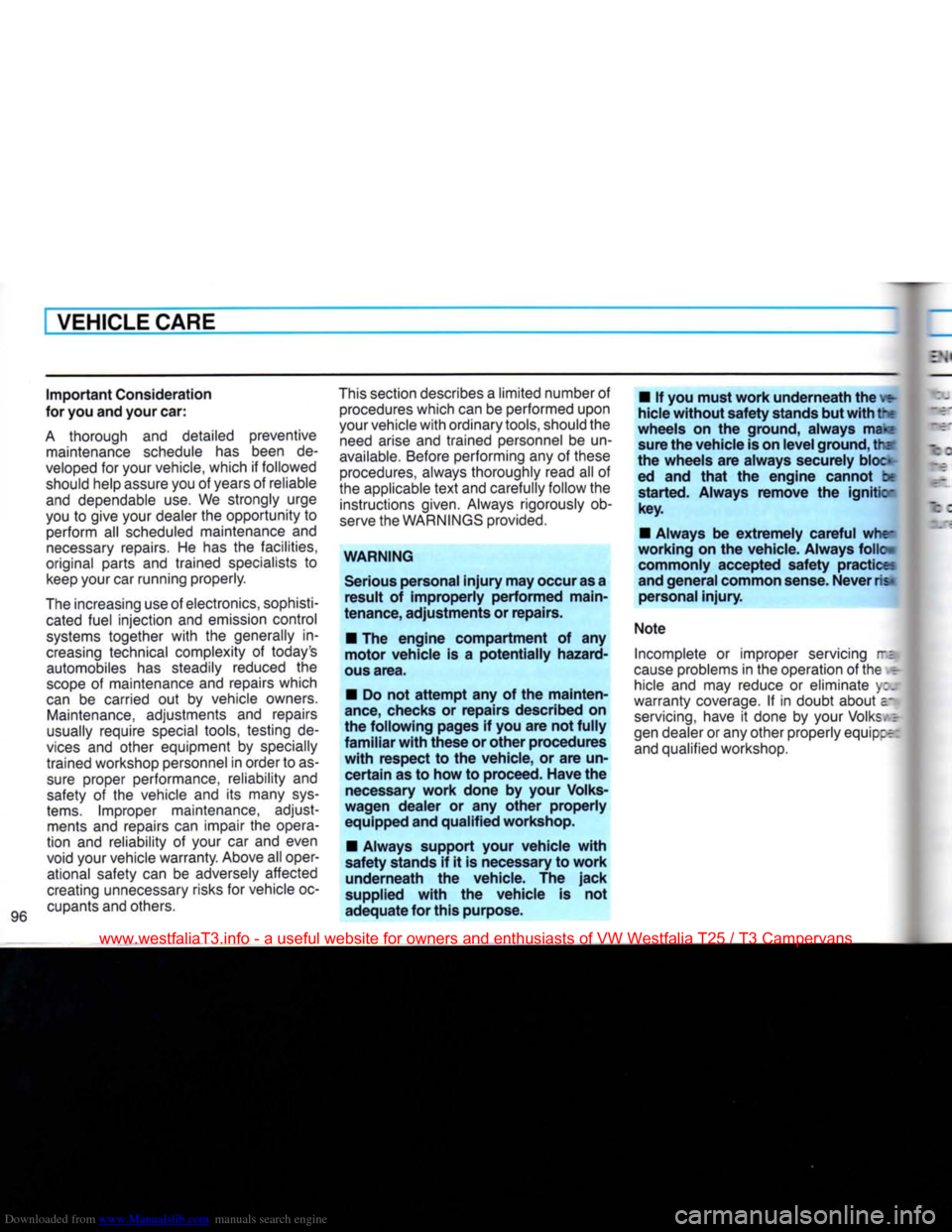
Downloaded from www.Manualslib.com manuals search engine
VEHICLE CARE
Important
Consideration
for you and your car:
A
thorough and detailed preventive maintenance schedule has been de
veloped
for your vehicle, which if followed
should
help assure you of years of reliable
and
dependable use. We strongly urge
you to give your dealer the opportunity to perform all scheduled maintenance and
necessary
repairs. He has the facilities,
original parts and trained specialists to
keep
your car running properly.
The
increasing use of electronics, sophisti
cated
fuel injection and emission control
systems
together
with
the generally in
creasing
technical complexity of today's automobiles has steadily reduced the
scope
of maintenance and repairs which
can
be carried out by vehicle owners.
Maintenance,
adjustments and repairs
usually
require special tools, testing de
vices
and other equipment by specially
trained workshop personnel in order to as
sure
proper performance, reliability and
safety of the vehicle and its many
sys
tems.
Improper maintenance, adjust ments and repairs can impair the opera
tion and reliability of your car and even
void your vehicle warranty. Above all oper ational safety can be adversely affected
creating unnecessary risks for vehicle oc
cupants and others.
This
section describes a limited number of
procedures
which can be performed upon
your vehicle
with
ordinary tools, should the
need
arise and trained personnel be un
available.
Before performing any of these
procedures,
always thoroughly read all of
the applicable
text
and carefully follow the instructions given. Always rigorously ob
serve
the
WARNINGS
provided.
WARNING
Serious personal
injury
may occur as a
result
of
improperly
performed
main
tenance,
adjustments
or
repairs.
• The
engine
compartment
of any
motor
vehicle
is a
potentially
hazard
ous
area.
• Do not
attempt
any of the
mainten
ance, checks or
repairs
described on
the
following
pages if you are not
fully
familiar
with
these
or
other
procedures
with
respect
to the vehicle, or are un
certain
as to how to proceed.
Have
the necessary
work
done
by your Volks
wagen
dealer
or any
other
properly
equipped
and
qualified
workshop.
•
Always support
your
vehicle
with
safety
stands if it is necessary to
work
underneath
the vehicle. The
jack
supplied
with
the
vehicle
is not
adequate
for
this
purpose. • If you
must
work
underneath
the . =-
hide
without
safety
stands but
with
t--t
wheels
on the ground,
always
ma-: sure the
vehicle
is on
level
ground, tr:
the
wheels
are
always
securely bloc ed and
that
the
engine
cannot
•
started.
Always
remove
the
ignitio-
key.
•
Always
be
extremely
careful
whe-
working
on the vehicle.
Always
folic commonly accepted
safety
practice*
and
general
common sense.
Never
ris• personal
injury.
Note
Incomplete or improper servicing ri
cause
problems in the operation of the r-
hicle
and may reduce or eliminate y;.
warranty coverage. If in doubt about a-
servicing,
have it done by your
Volks/
E-
gen
dealer or any other properly equips
and
qualified workshop.
www.westfaliaT3.info - a useful website for owners and enthusiasts of VW Westfalia T25 / T3 Campervans
Page 102 of 165
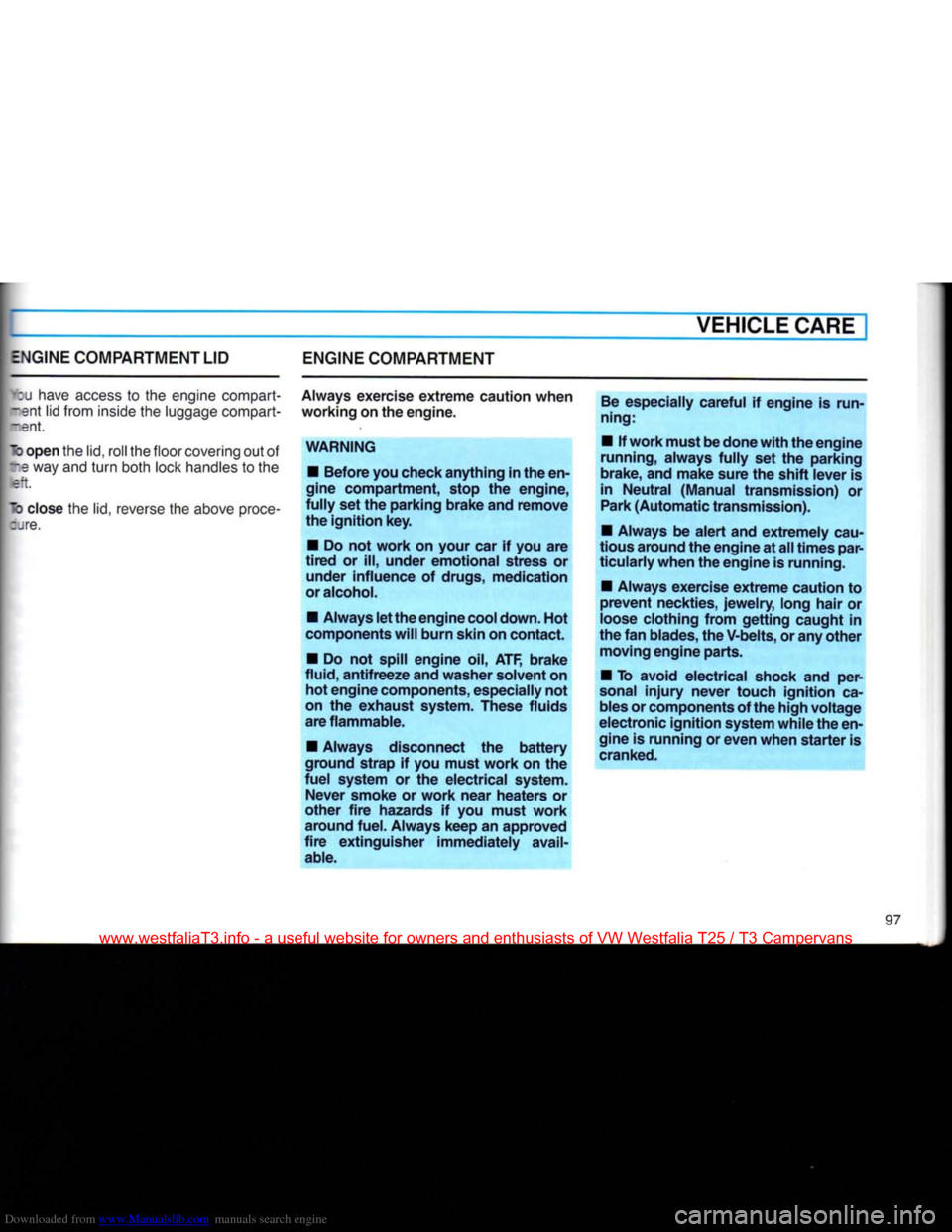
Downloaded from www.Manualslib.com manuals search engine
VEHICLE
CARE
ENGINE
COMPARTMENT LID
mu
have access to the engine compart-
•Mit
lid from inside the luggage compart- -ent.
"lb
open the
lid,
roll the floor covering out of
~9
way and
turn
both lock handles to the
Tb close the lid, reverse the above proce- ;jre.
ENGINE
COMPARTMENT
Always exercise extreme caution when
working on the engine. WARNING
•
Before you check anything in the en
gine compartment, stop the engine,
fully set the parking brake and remove
the ignition key.
•
Do not work on
your
car if you are
tired or ill, under emotional stress or under influence of drugs, medication
or alcohol.
•
Always let the engine cool down. Hot
components will burn skin on contact.
•
Do not spill engine oil, ATF, brake
fluid,
antifreeze and washer solvent on hot engine components, especially not
on the exhaust system.
These
fluids
are
flammable.
•
Always disconnect the battery
ground strap if you must work on the
fuel
system or the electrical system.
Never
smoke or work near heaters or
other fire hazards if you must work
around
fuel.
Always keep an approved
fire extinguisher immediately
avail
able.
Be
especially careful if engine is run
ning:
•
If work must be done with the engine
running, always fully set the parking
brake,
and make sure the shift lever is
in Neutral (Manual transmission) or
Park
(Automatic transmission).
•
Always be alert and extremely
cau
tious around the engine at
all
times par
ticularly when the engine is running.
•
Always exercise extreme caution to
prevent
neckties,
jewelry,
long hair or
loose clothing from getting caught in
the fan blades, the V-belts, or any other
moving
engine parts.
•
To avoid electrical shock and per
sonal
injury
never
touch ignition ca
bles
or components of the high voltage
electronic ignition system while the en
gine is running or even when starter is
cranked.
97
www.westfaliaT3.info - a useful website for owners and enthusiasts of VW Westfalia T25 / T3 Campervans
Page 103 of 165
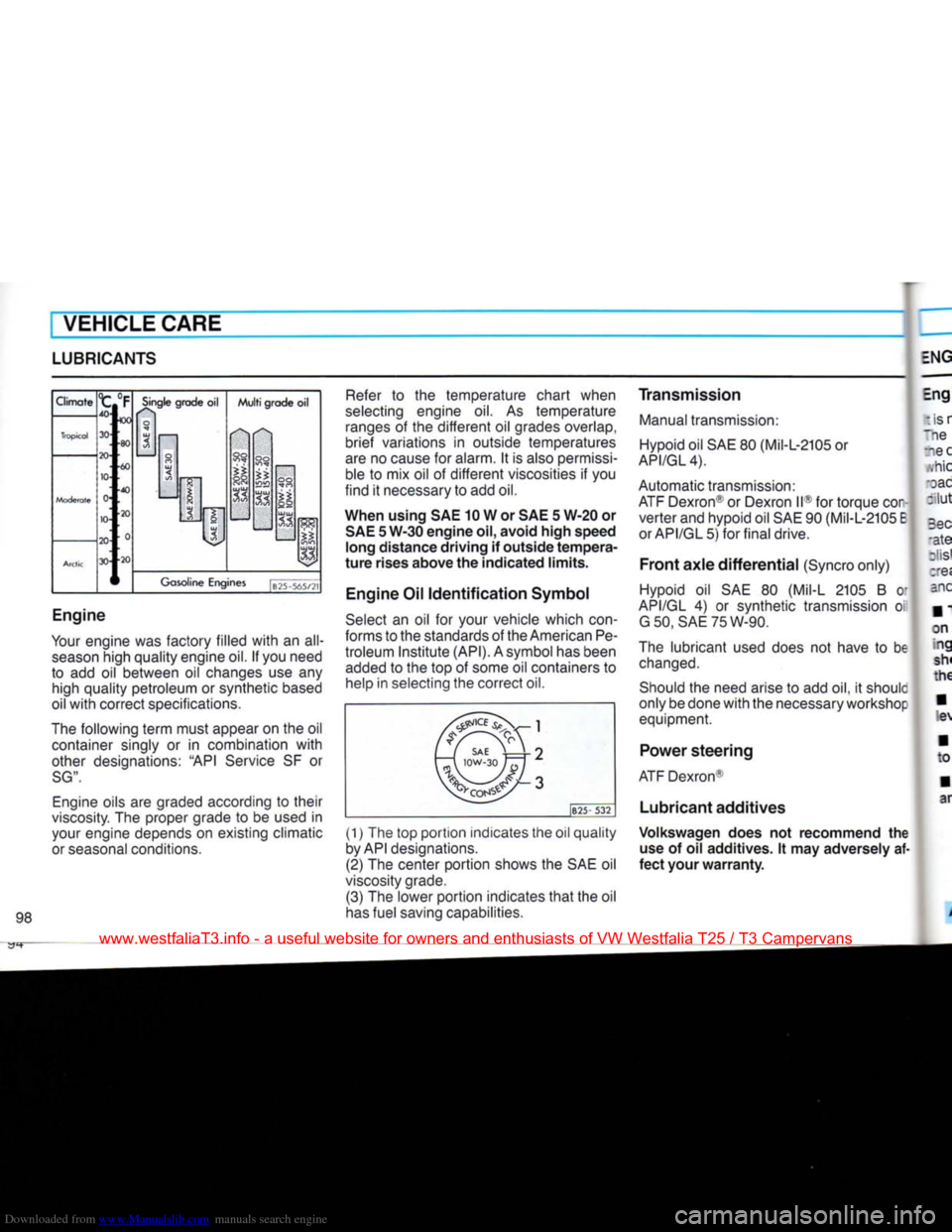
Downloaded from www.Manualslib.com manuals search engine
[
VEHICLE
CARE
LUBRICANTS I
Climate Tropical
40'
30-
20- 10-
0-
10'
20
30'
Single grade oil
Multi grade oil
Gasoline Engines
|B25-565/21
Engine
Your engine was factory filled with an all- season high quality engine oil. If you need
to add oil between oil changes use any high quality petroleum or synthetic based
oil with correct specifications.
The following term must appear on the oil container singly or in combination with
other designations: "API Service SF or
SG".
Engine oils are graded according to their
viscosity. The proper grade to be used in your engine depends on existing climatic
or seasonal conditions. Refer to the temperature chart when
selecting engine oil. As temperature ranges of the different oil grades overlap,
brief variations in outside temperatures
are no cause for alarm. It is also permissi ble to mix oil of different viscosities if you
find it necessary to add oil.
When using SAE 10 W or SAE 5 W-20 or SAE 5 W-30 engine oil, avoid high speed
long distance driving if outside tempera
ture rises above the indicated limits.
Engine Oil Identification Symbol
Select an oil for your vehicle which
con
forms to the standards of the American Pe
troleum Institute (API). A symbol has been added to the top of some oil containers to help in selecting the correct oil.
-l -l
/ / SAE '. j -2
t—i iow-3o jji -3
1B25-
532
98 (1) The top portion indicates the oil quality
by API designations.
(2) The center portion shows the SAE oil
viscosity grade.
(3) The lower portion indicates that the oil
has fuel saving capabilities. Transmission
Manual transmission: Hypoid oil SAE 80 (Mil-L-2105 or
API/GL4).
Automatic transmission:
ATF Dexron® or Dexron II® for torque cor
verter and hypoid oil SAE 90 (Mil-L-2105
E
orAPI/GL5) for final drive.
Front axle differential (Syncro only)
Hypoid oil SAE 80 (Mil-L 2105 B M
API/GL 4) or synthetic transmission oi
G50,
SAE75W-90.
The lubricant used does not have to be
changed.
Should the need arise to add oil, it shoulc
only be done with the necessary workshop equipment.
Power steering
ATF Dexron®
Lubricant additives
Volkswagen does not recommend the use of oil additives. It may adversely af
fect your warranty.
www.westfaliaT3.info - a useful website for owners and enthusiasts of VW Westfalia T25 / T3 Campervans
Page 104 of 165
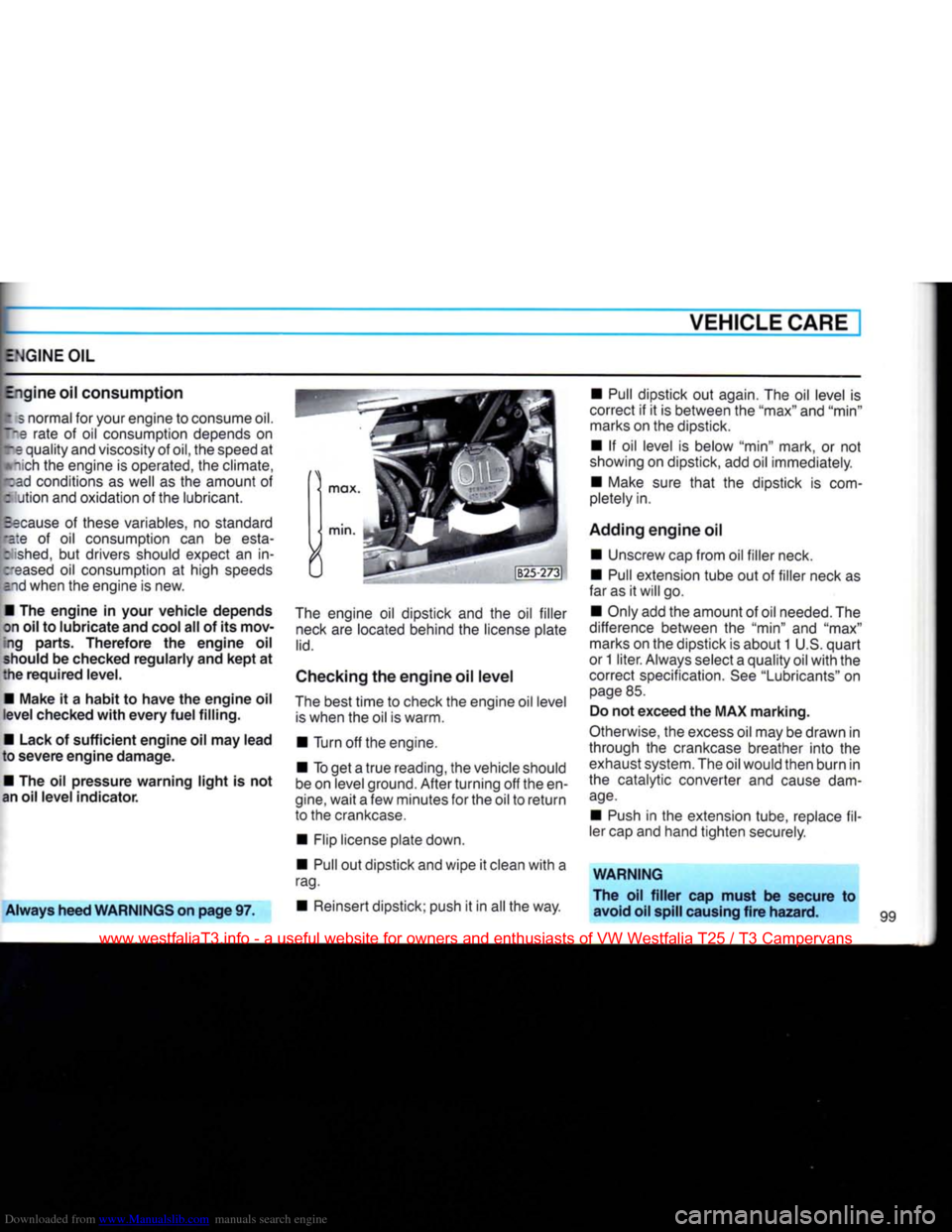
Downloaded from www.Manualslib.com manuals search engine
VEHICLE CARE
ENGINE OIL
Engine oil consumption t 3 normal for your engine to consume oil.
T-Q
rate of oil consumption depends on
re quality and viscosity of
oil,
the speed at
Mich
the engine is operated, the climate,
read
conditions as well as the amount of : ution and oxidation of the lubricant.
Because
of these variables, no standard
•e:e
of oil consumption can be esta-
:
shed,
but drivers should expect an in
creased
oil consumption at high speeds
s.nd when the engine is new.
• The
engine
in your
vehicle
depends
on oil to
lubricate
and cool all of its
mov
ing
parts.
Therefore
the
engine
oil
should be checked
regularly
and
kept
at
the
required
level.
•
Make
it a
habit
to
have
the
engine
oil
level
checked
with
every
fuel
filling.
• Lack of
sufficient
engine
oil may
lead
to
severe
engine
damage.
• The oil pressure
warning
light
is not
an oil
level
indicator.
Always
heed
WARNINGS
on
page
97.
The
engine oil dipstick and the oil filler
neck
are located behind the license plate
lid.
Checking the
engine
oil
level
The
best time to check the engine oil level
is
when the oil is warm.
• Turn off the engine.
• To get a true reading, the vehicle should
be
on level ground. After turning off the en
gine,
wait a few minutes for the oil to return
to the crankcase.
• Flip license plate down.
• Pull out dipstick and wipe it clean
with
a
rag.
• Reinsert dipstick; push it in all the way. • Pull dipstick out again. The oil level is
correct if it is between the "max" and "min" marks on the dipstick.
• If oil level is below "min" mark, or not
showing on dipstick, add oil immediately.
• Make sure
that
the dipstick is com
pletely in.
Adding
engine
oil • Unscrew cap from oil filler neck.
• Pull extension tube out of filler neck as
far as it will go.
• Only add the amount of oil needed. The
difference between the "min" and "max" marks on the dipstick is about
1
U.S. quart
or
1
liter. Always select a quality oil
with
the
correct specification. See "Lubricants" on
page
85.
Do not exceed the MAX
marking.
Otherwise,
the excess oil may be drawn in
through the crankcase breather into the exhaust system. The oil would then burn in
the catalytic converter and cause dam
age.
•
Push
in the extension tube, replace fil
ler cap and hand tighten securely.
WARNING
The oil
filler
cap
must
be secure to avoid oil spill causing
fire
hazard.
www.westfaliaT3.info - a useful website for owners and enthusiasts of VW Westfalia T25 / T3 Campervans
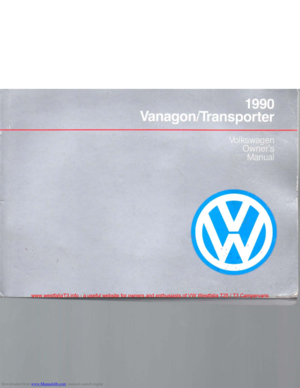 1
1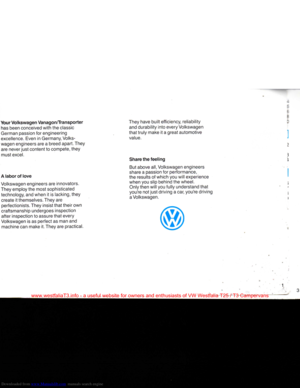 2
2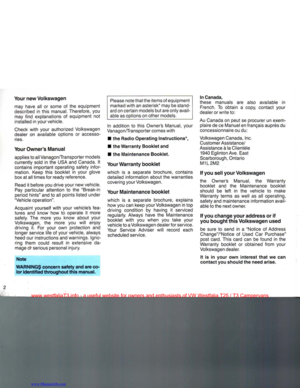 3
3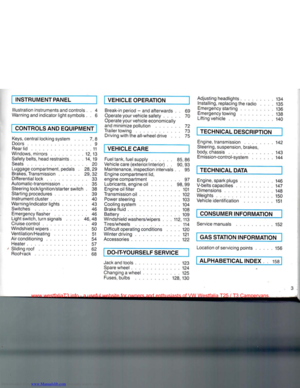 4
4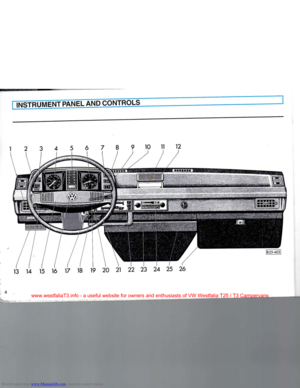 5
5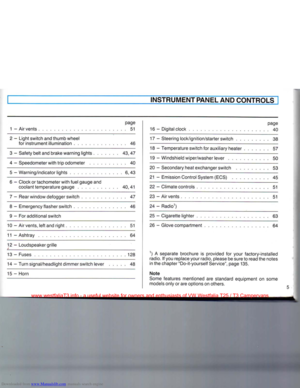 6
6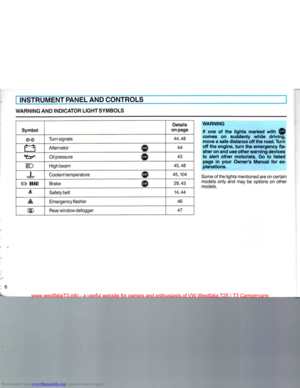 7
7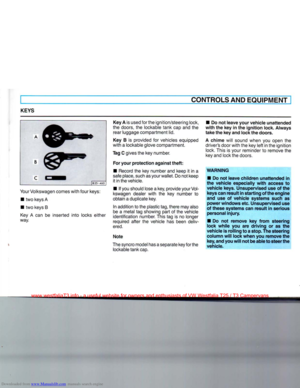 8
8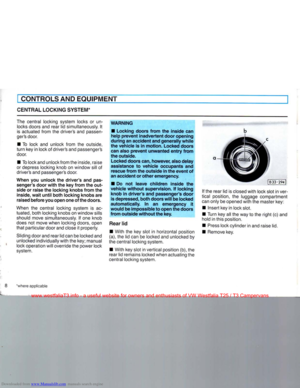 9
9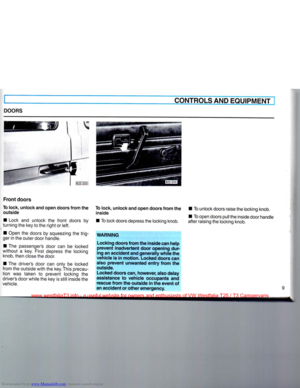 10
10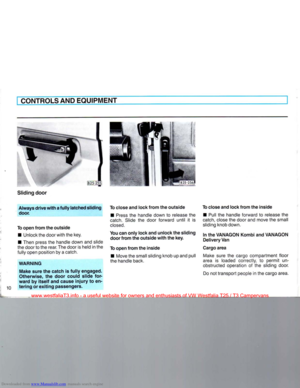 11
11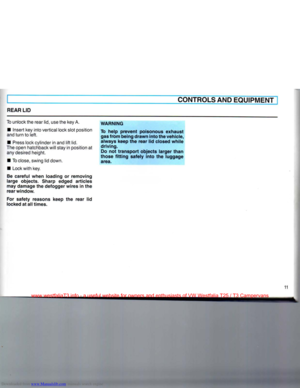 12
12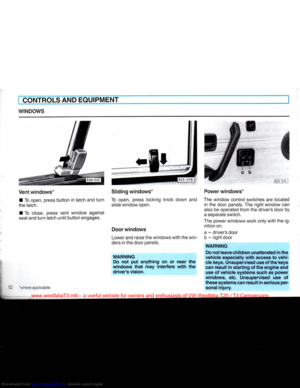 13
13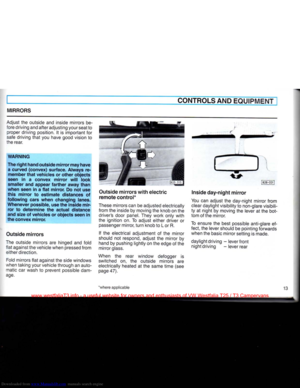 14
14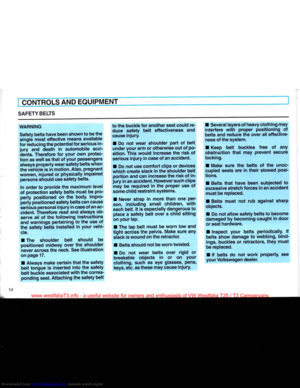 15
15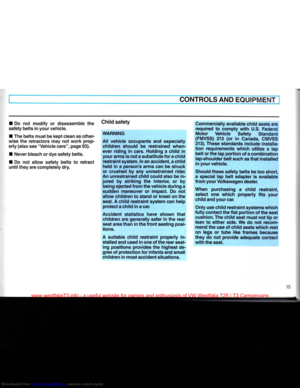 16
16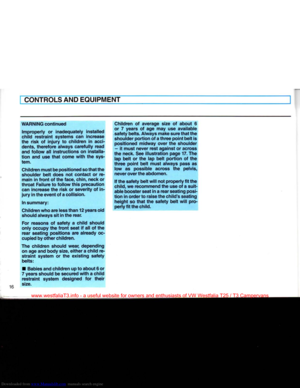 17
17 18
18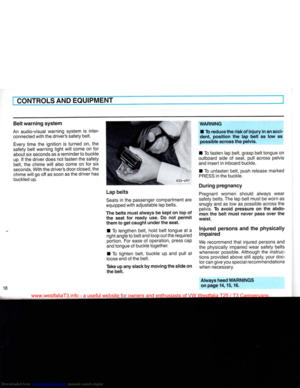 19
19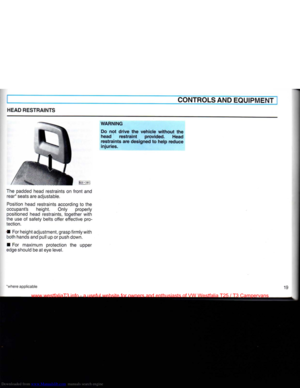 20
20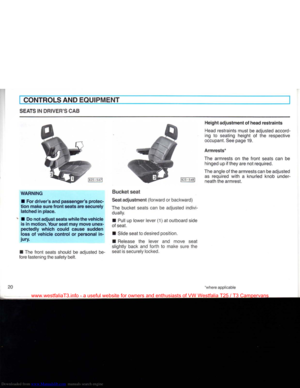 21
21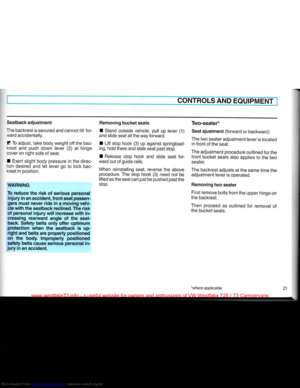 22
22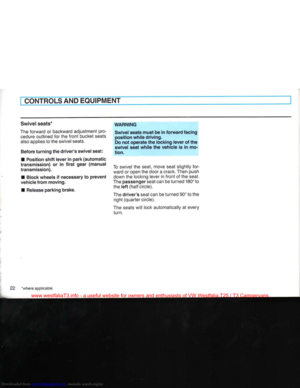 23
23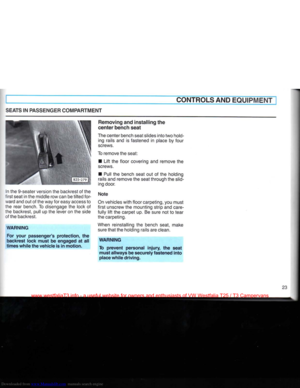 24
24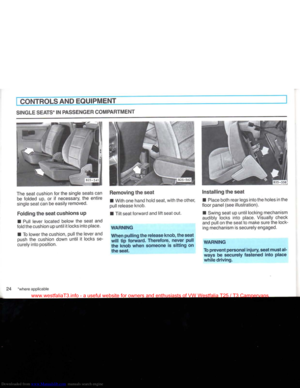 25
25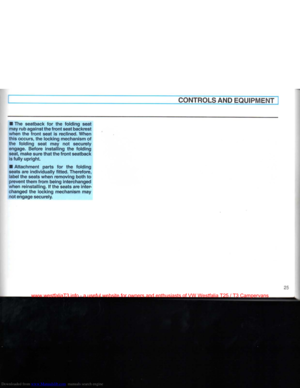 26
26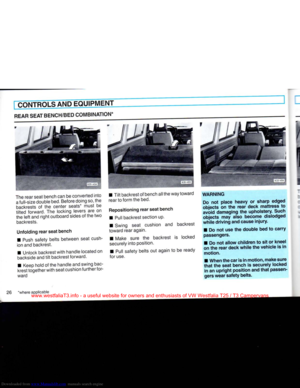 27
27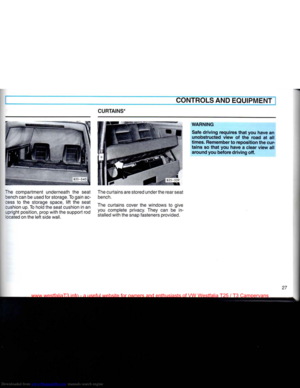 28
28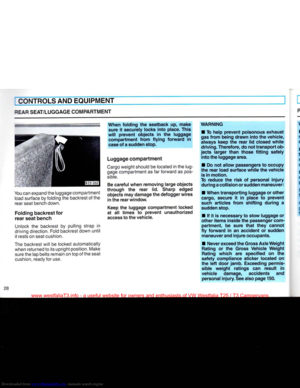 29
29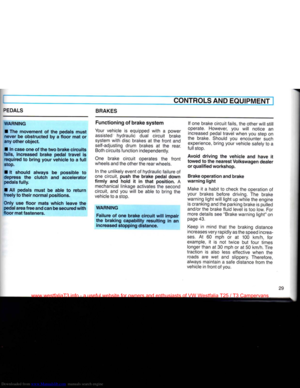 30
30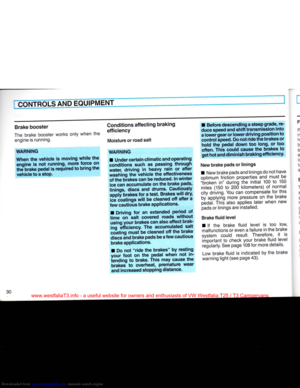 31
31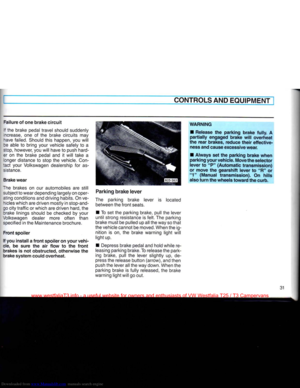 32
32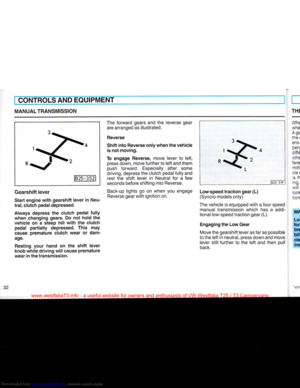 33
33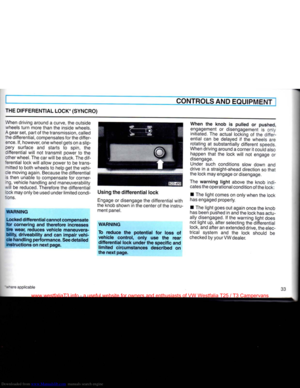 34
34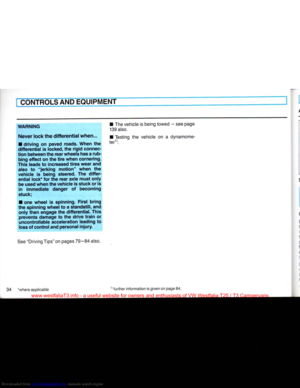 35
35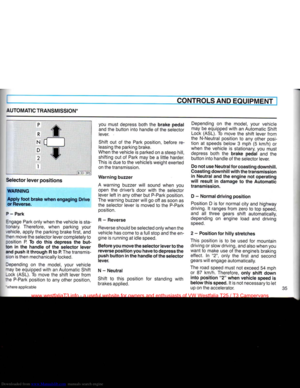 36
36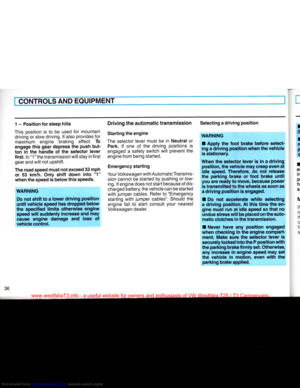 37
37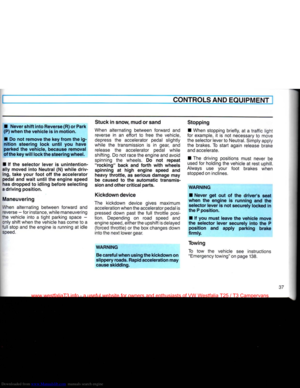 38
38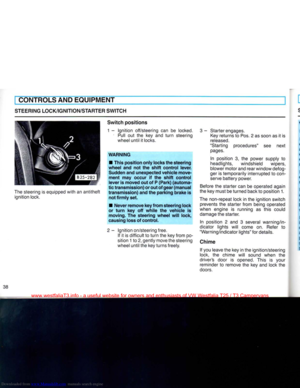 39
39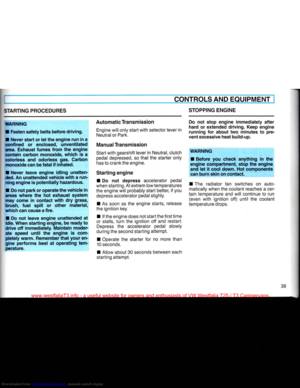 40
40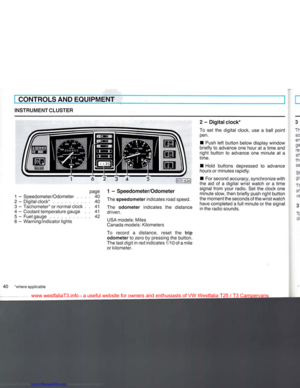 41
41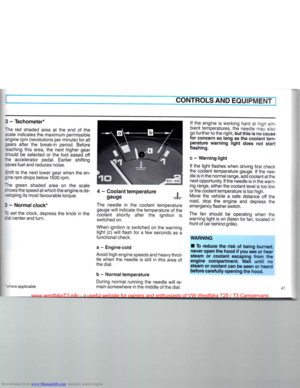 42
42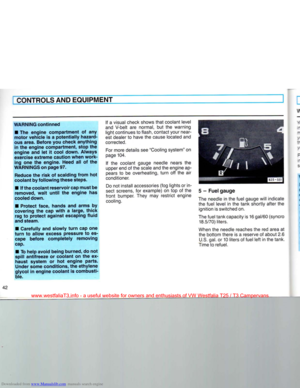 43
43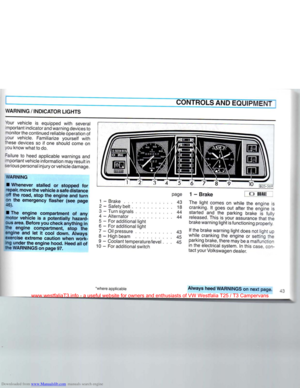 44
44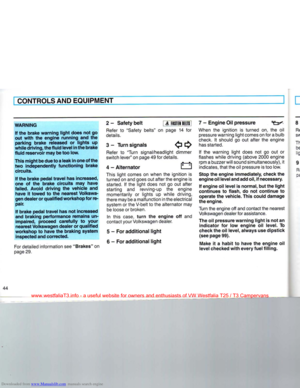 45
45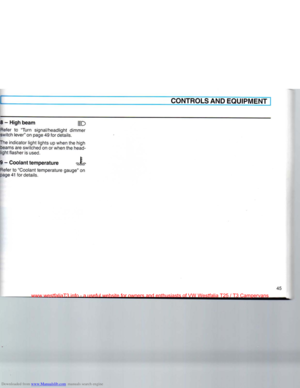 46
46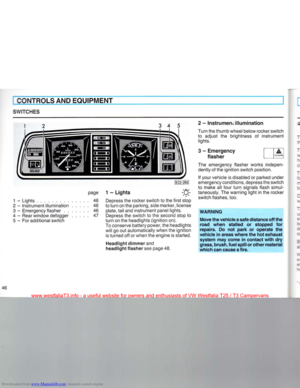 47
47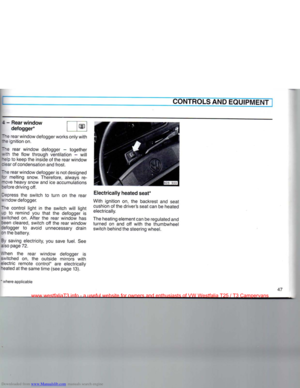 48
48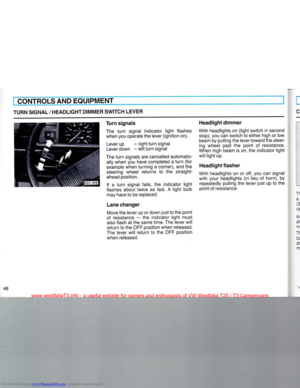 49
49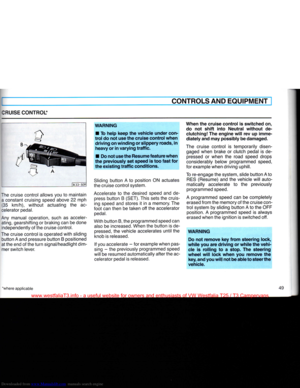 50
50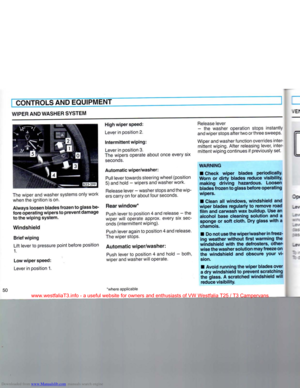 51
51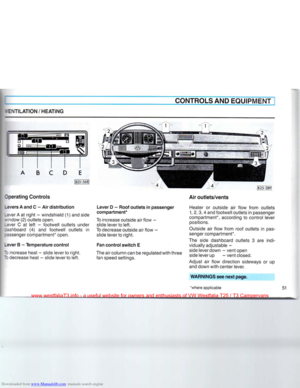 52
52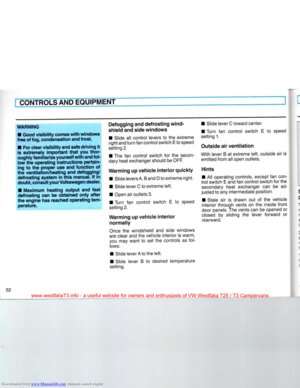 53
53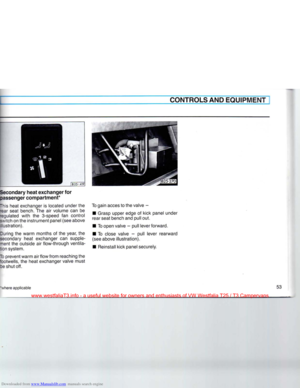 54
54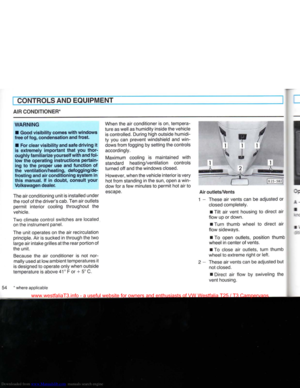 55
55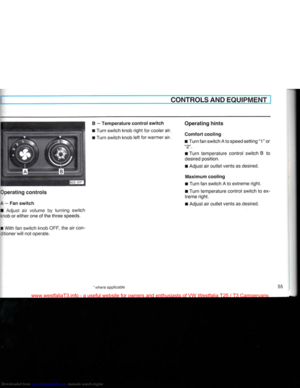 56
56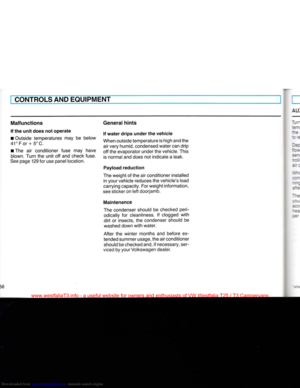 57
57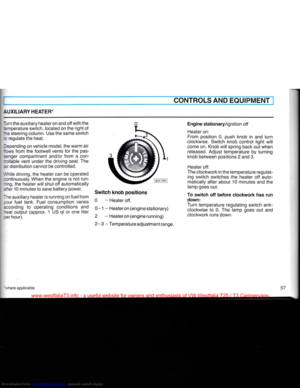 58
58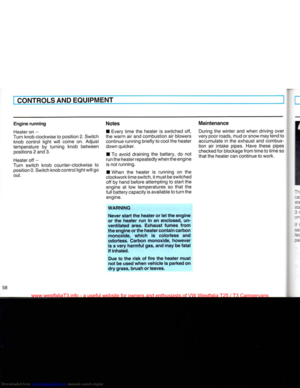 59
59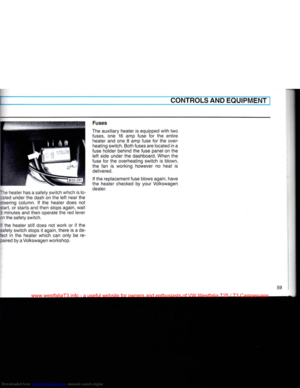 60
60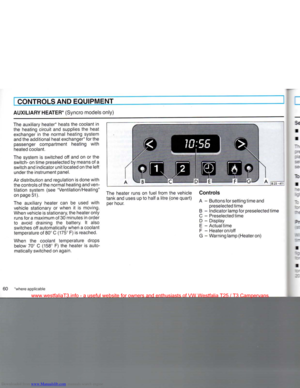 61
61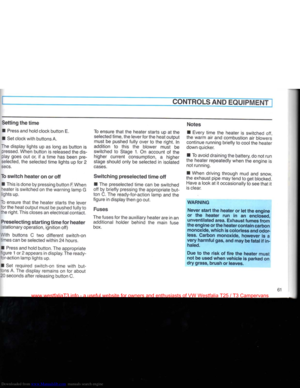 62
62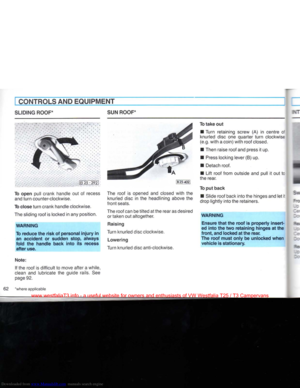 63
63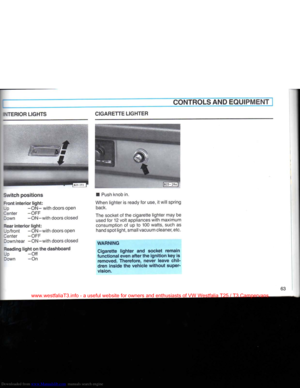 64
64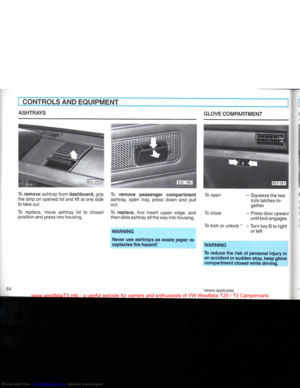 65
65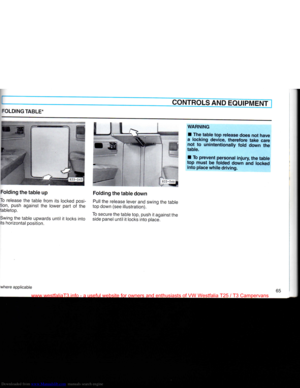 66
66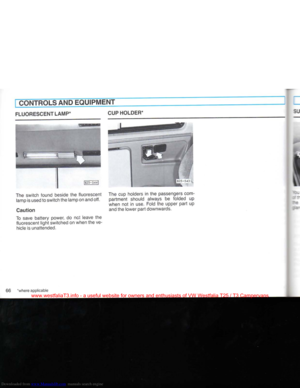 67
67 68
68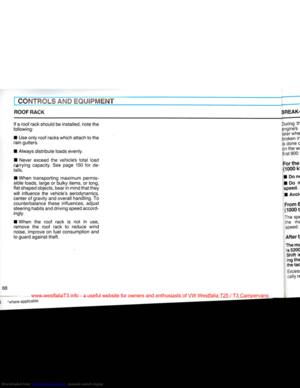 69
69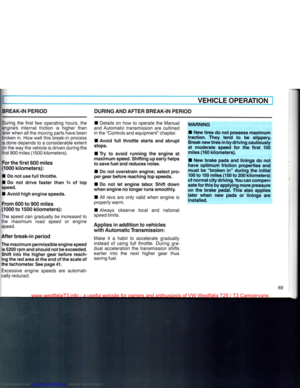 70
70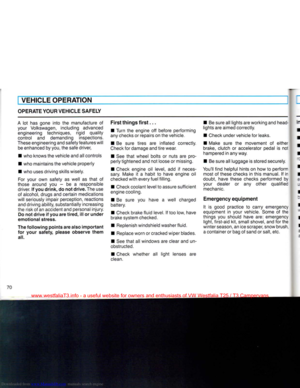 71
71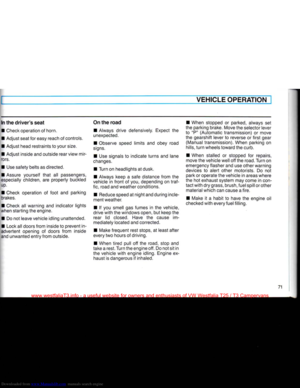 72
72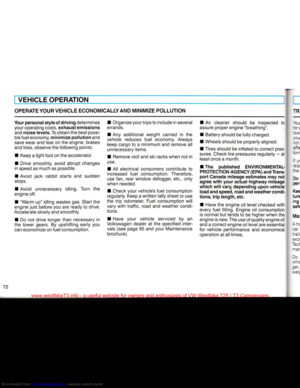 73
73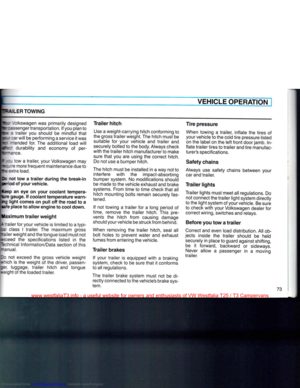 74
74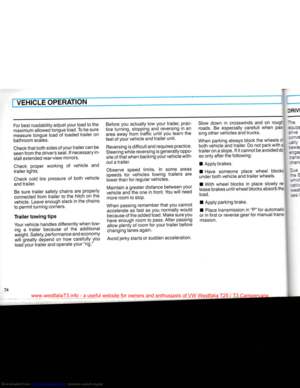 75
75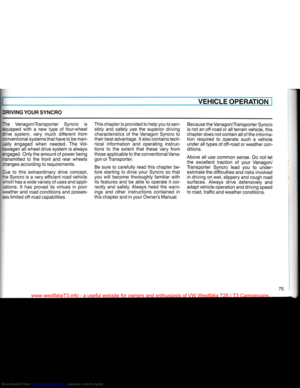 76
76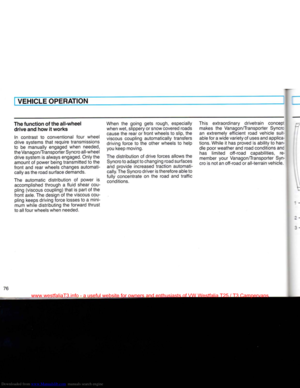 77
77 78
78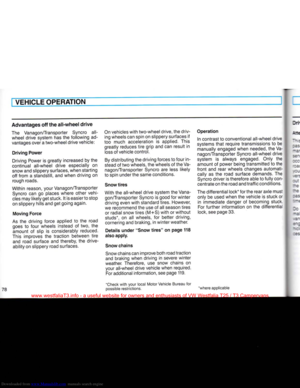 79
79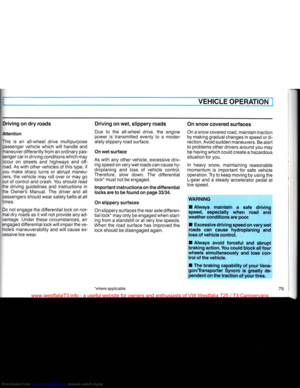 80
80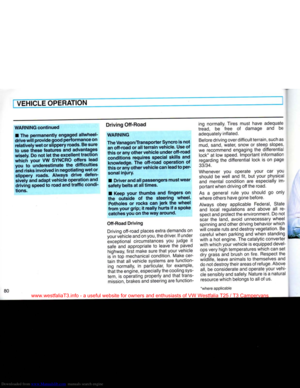 81
81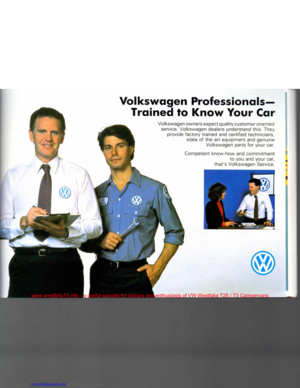 82
82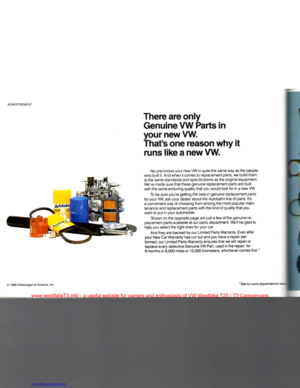 83
83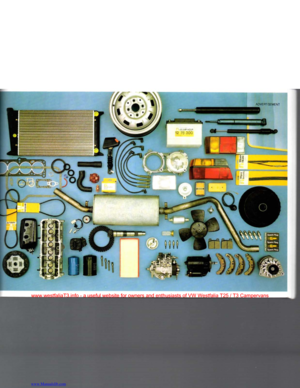 84
84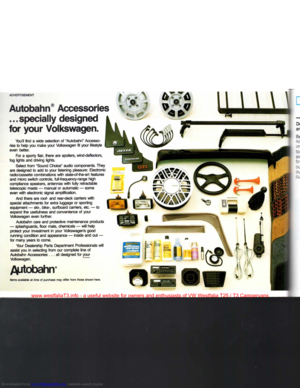 85
85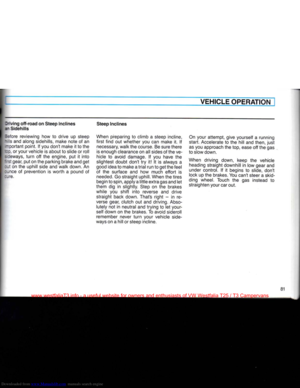 86
86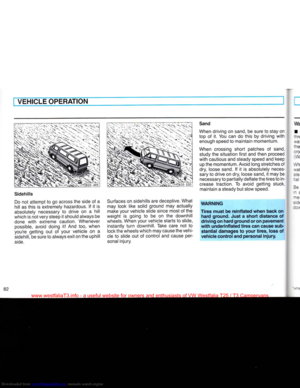 87
87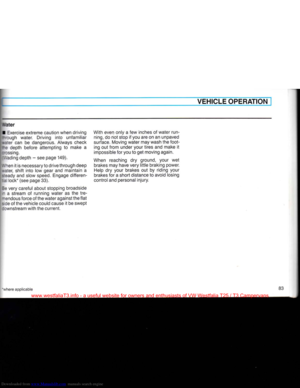 88
88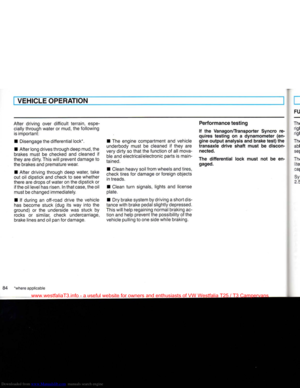 89
89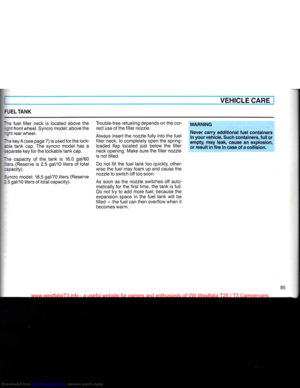 90
90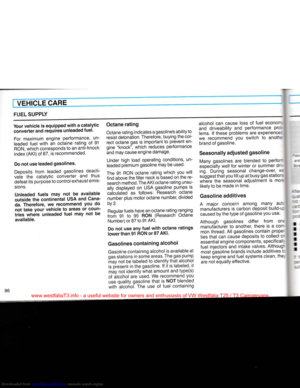 91
91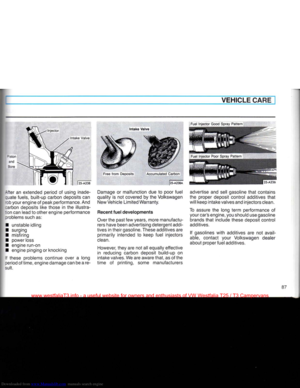 92
92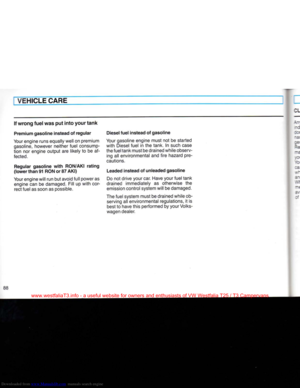 93
93 94
94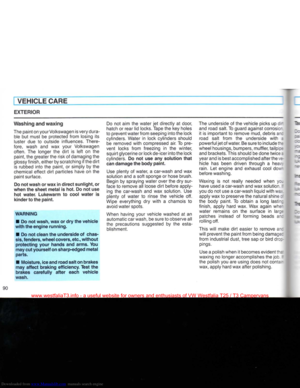 95
95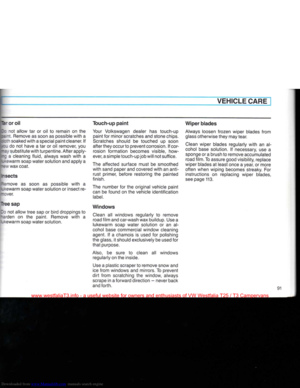 96
96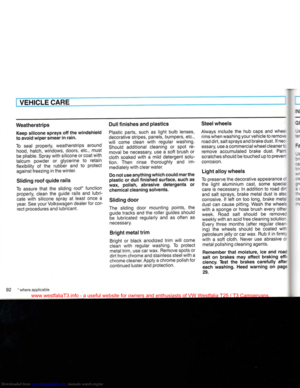 97
97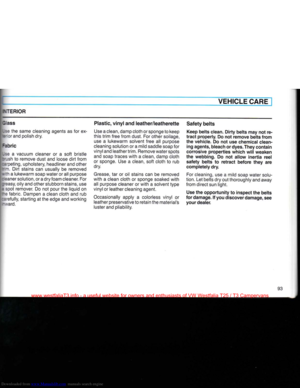 98
98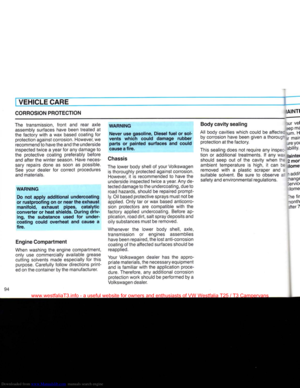 99
99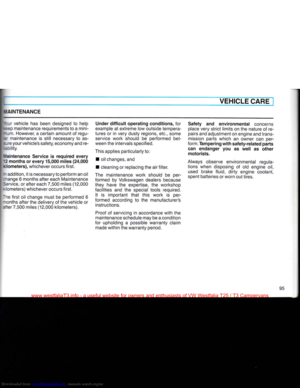 100
100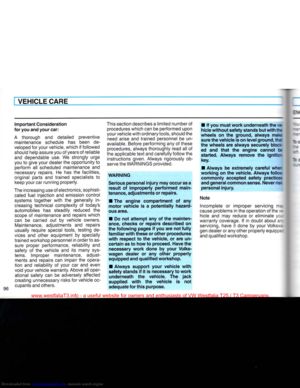 101
101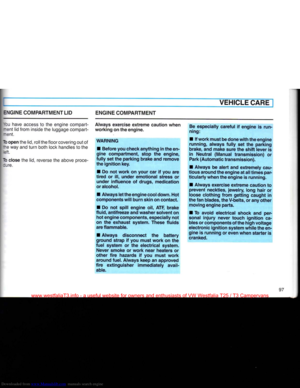 102
102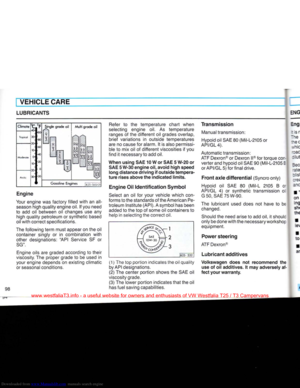 103
103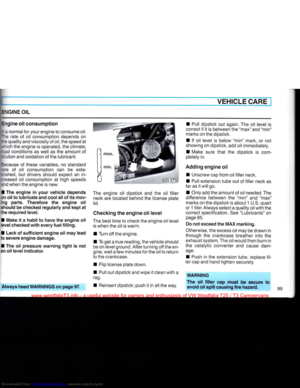 104
104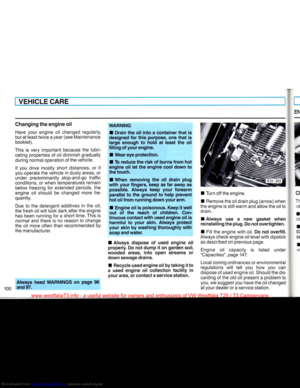 105
105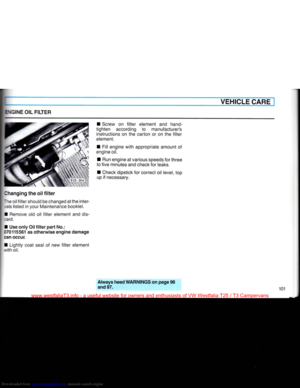 106
106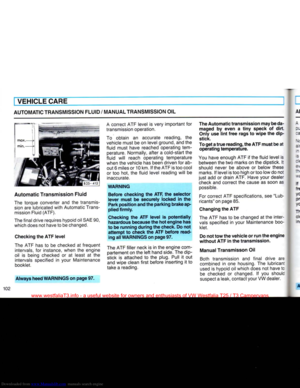 107
107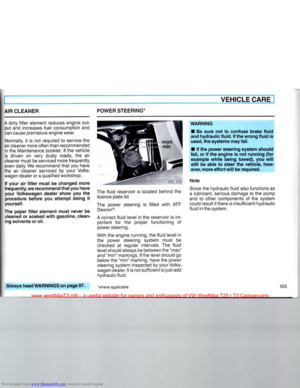 108
108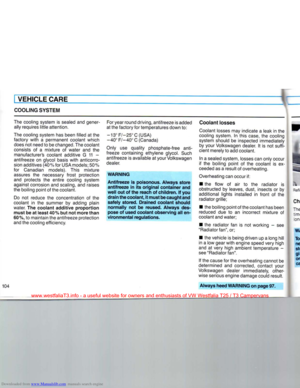 109
109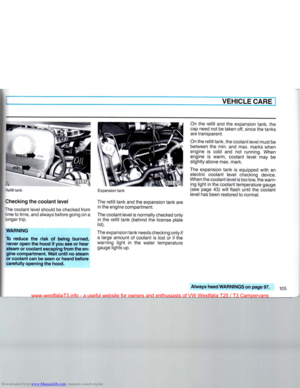 110
110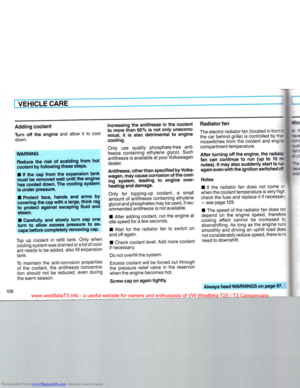 111
111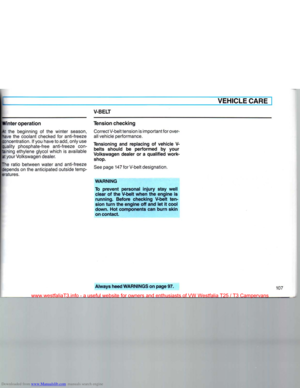 112
112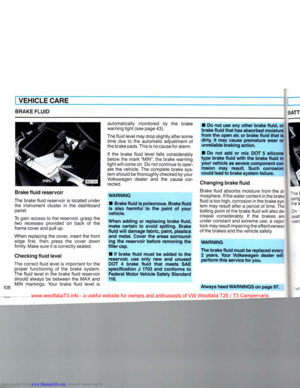 113
113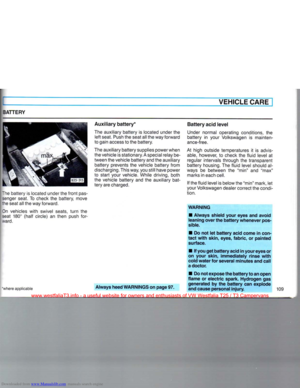 114
114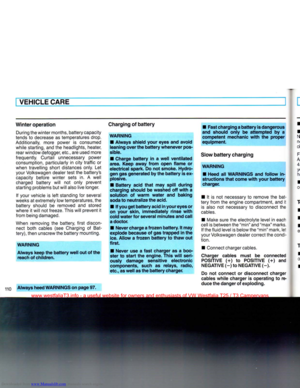 115
115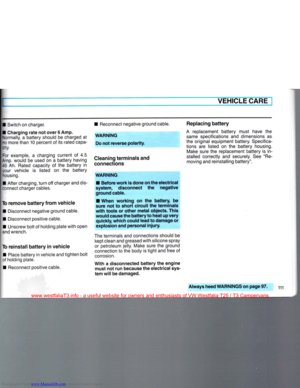 116
116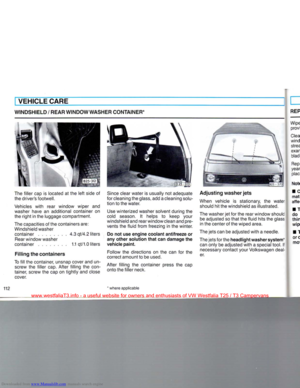 117
117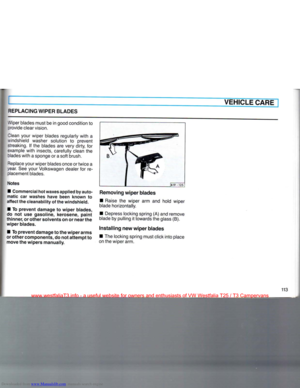 118
118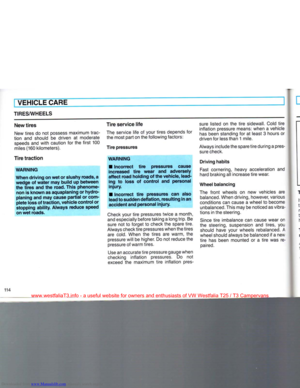 119
119 120
120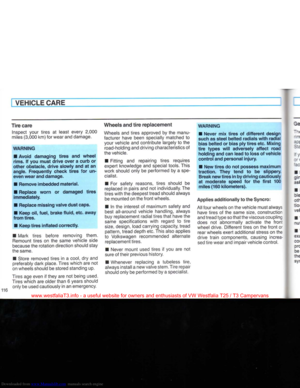 121
121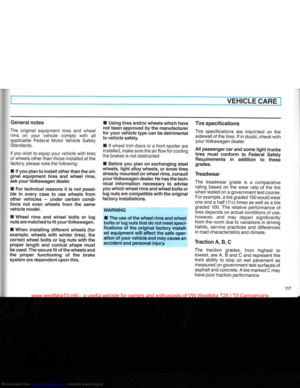 122
122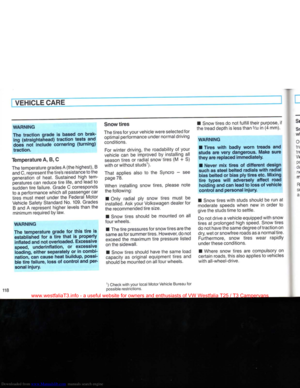 123
123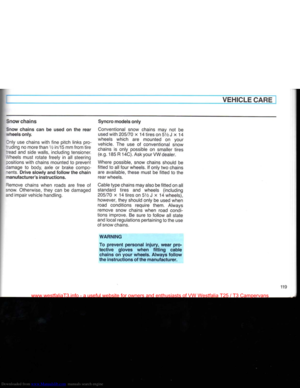 124
124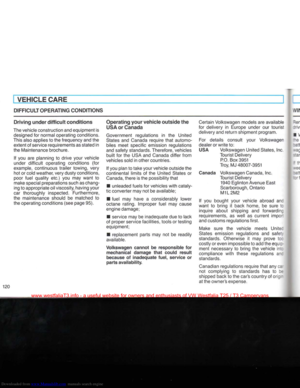 125
125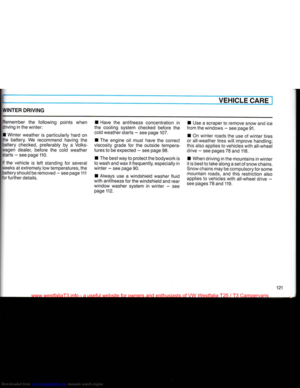 126
126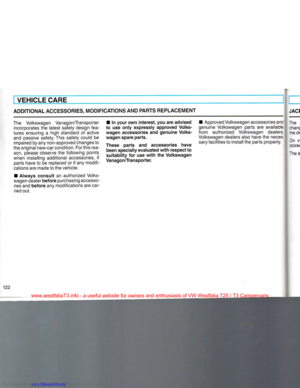 127
127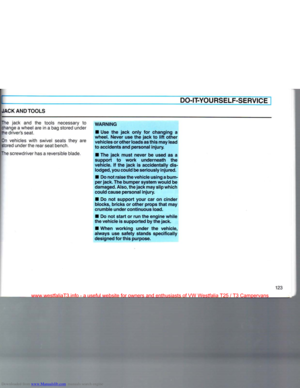 128
128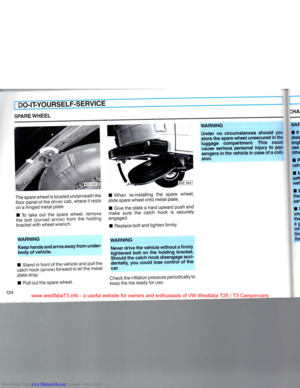 129
129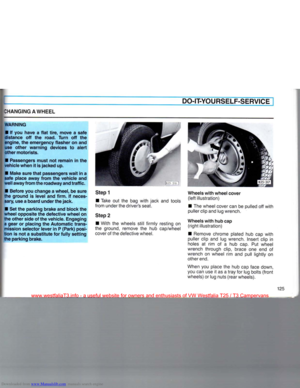 130
130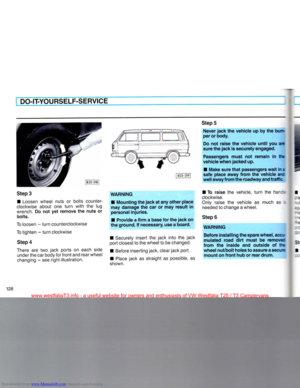 131
131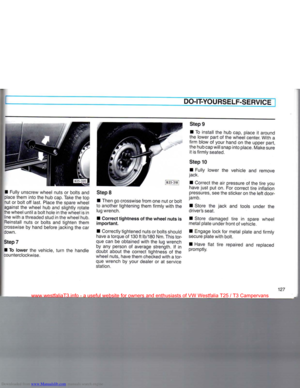 132
132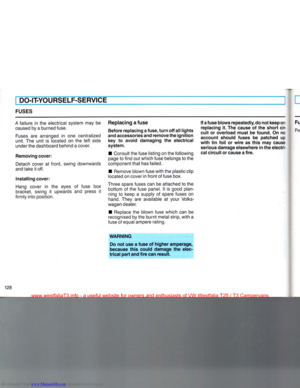 133
133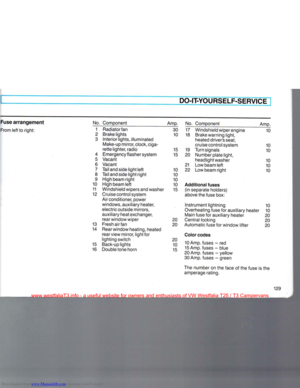 134
134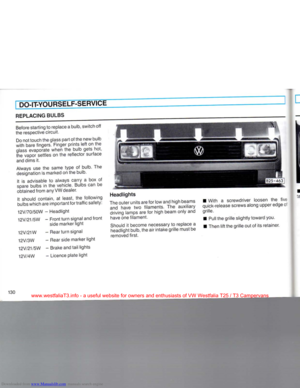 135
135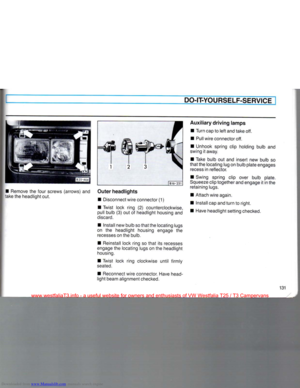 136
136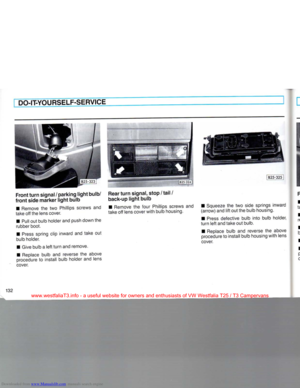 137
137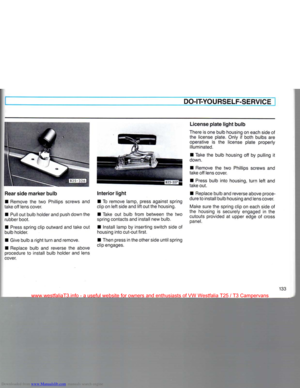 138
138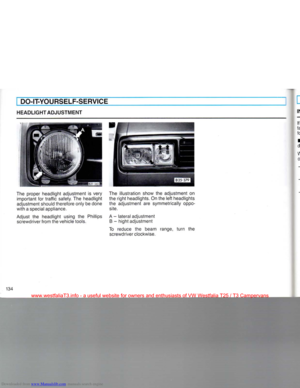 139
139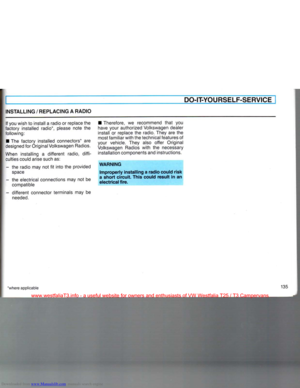 140
140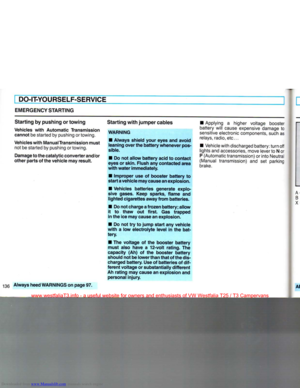 141
141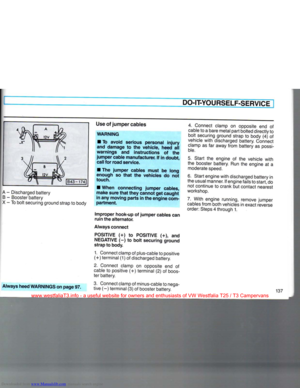 142
142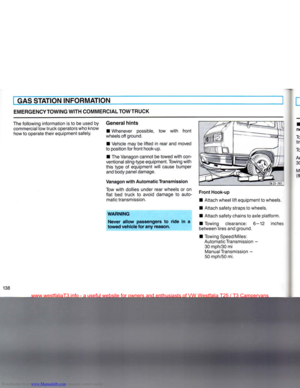 143
143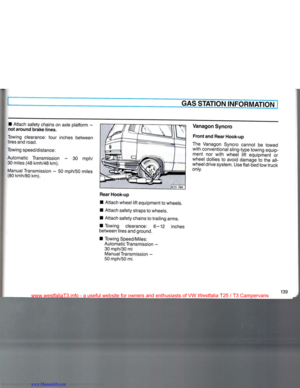 144
144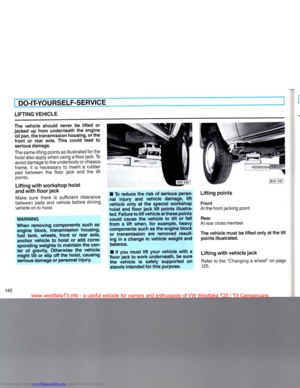 145
145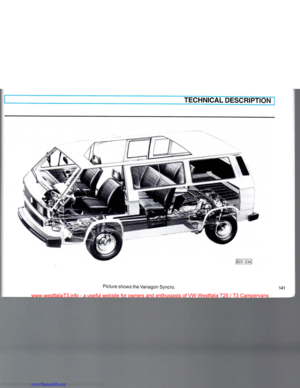 146
146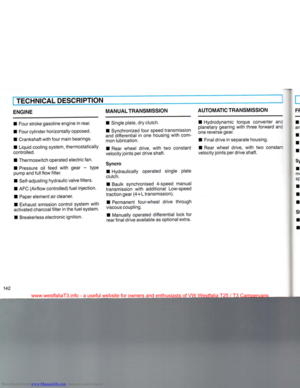 147
147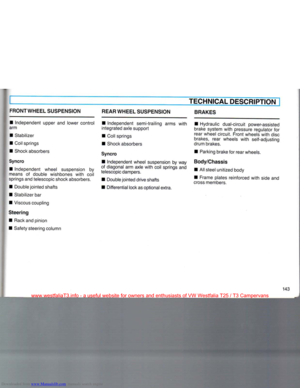 148
148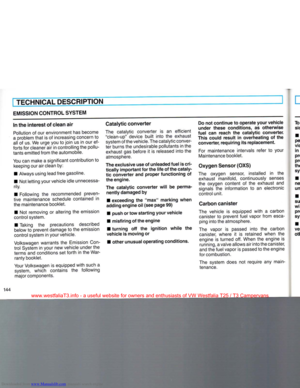 149
149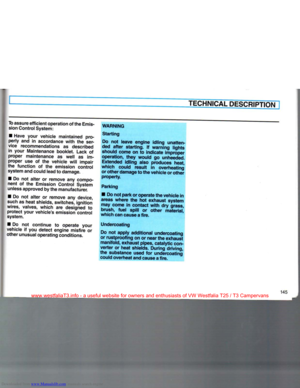 150
150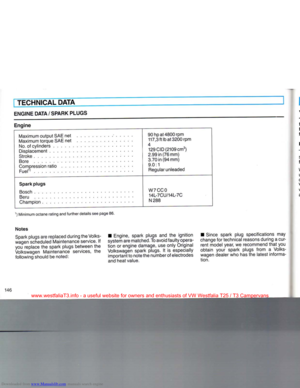 151
151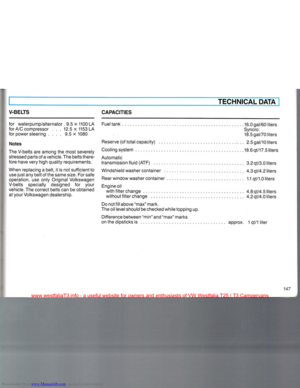 152
152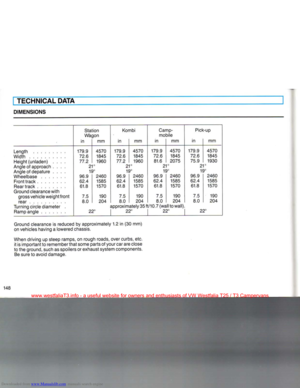 153
153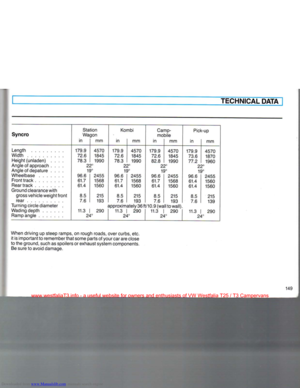 154
154 155
155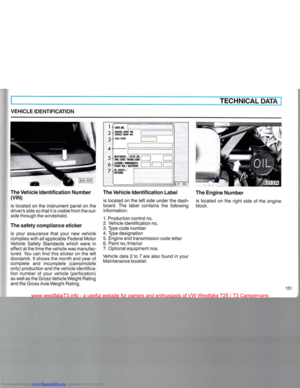 156
156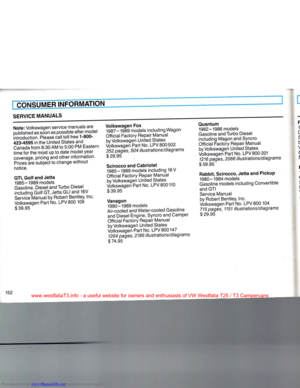 157
157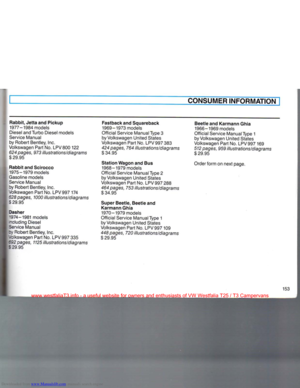 158
158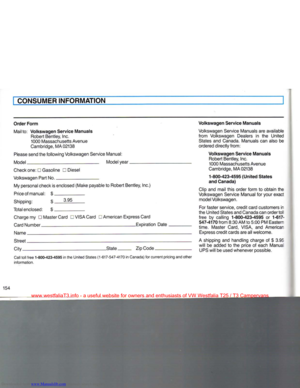 159
159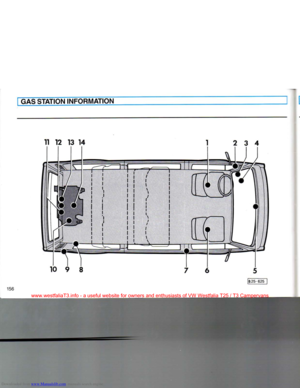 160
160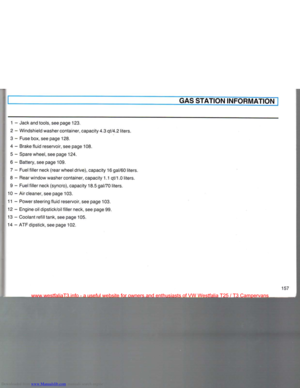 161
161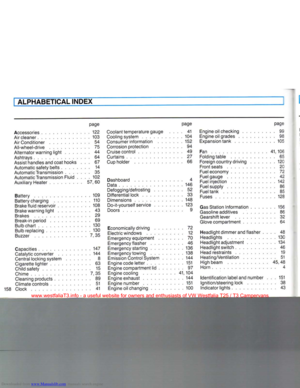 162
162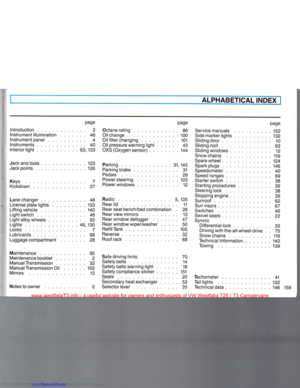 163
163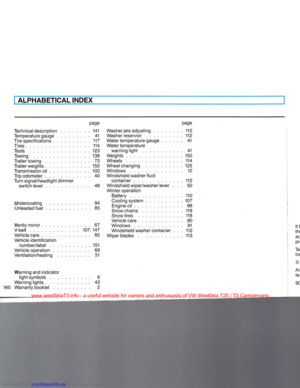 164
164






